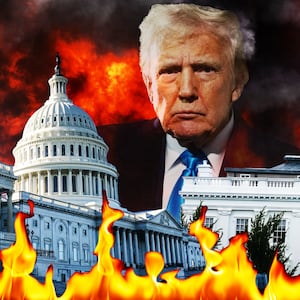We’re just over a month into this new administration, and I remain furious. Not just at President Trump or Elon Musk or any of the DOGE dinguses brought on to wreak havoc on America—and the world. But at us. At a nation so spoiled that we took Lady Justice’s sword and plunged it, seppuku-style, into our own bloated belly.
The question of why we did so will be debated for generations, but I’ve lately been wondering whether this moment was inevitable. The American far right has been jockeying for this moment for decades, the wholesale destruction of what the perpetually moist-looking billionaire Trump supporter Peter Thiel recently referred to as the ancien régime.
This phrase refers to the old French system, run by a combination of powerful nobility and the clergy, in which all were subject to the whims of an absolute monarch. When France’s revolutionaries used it, the phrase was derisive. After Trump declared himself “king” last week, Thiel’s usage now seems almost aspirational.
But this nouvelle régime itself looks very much like the ones revolutionaries have been overthrowing since 1776. Everything new is old again, or something like that?
So was it, in fact, inevitable that we arrive at this harrowing point? Were we always fated to find ourselves heaving our ship of state through this maelstrom of technology, oligarchy and white Christian nationalism? Does our current American misadventure foretell something worse just around the corner?
I suspect the answer is yes.
Which is why I greeted much of this last week’s news with, if not a shrug, then at least a sigh and a tightening of the belly. “Yes,” the headlines are telling us, “We’re really doing this.”
What “this” is remains unclear, not because the administration’s goals are unclear but because the Project 2025-ification of America is only a battleplan, not the battle. The battle itself is being fought in angry townhalls, at protests and demonstrations, with lawsuits and, it turns out, on the live feed of the Department of Housing and Urban Development headquarters, which saw an AI-generated video of Trump sucking Musk’s toes playing on a loop on the agency’s television monitors before maintenance workers figured out how to turn it off.
The battle is one we’ve fought before. Sometimes against adversaries beyond our shores, sometimes within. Sometimes we’ve fought it with rhetoric and sometimes with rifles. In some ways, our current civil war is a replay of the last one, in which a small population of wealthy white men deployed the time-honored weaponry of race and religion to convince a much larger population of poor white men that the federal government was an agent of tyranny.
Thankfully, our own cold civil war has yet to turn hot. Which raises the question: is the nouvelle régime seeking violence? Are they hoping to provoke demonstrations? I’m certainly not the only American casting a wary eye towards the military and wondering how they would respond to Defense Secretary Pete Hegseth ordering them to fire on political protestors. Moreover, I don’t think I’m paranoid to wonder.
Must it get very bad before we come together to make something good? If this moment was inevitable, I guess we have to ask ourselves how we envision what it looks like on the other side. We already know their vision: Moscow on the Potomac. But what is ours? What does it look like when this Trumpist movement is, inevitably, put down?
I have many questions—this piece makes that clear. To them, I have no concrete answers, but, for years, I’ve been advocating for a new Constitutional Convention. In the aftermath of a trauma like the one we’re likely to experience in the coming years, it seems to me that such an exercise would get tremendous buy-in from a reeling nation looking for a way forward.
I envision a yearlong, or even multi-year, assemblage of the best and brightest thinkers, elected by each state’s citizenry, with the goal of building something new on the foundation of our original founding document.
At its conclusion, this new American Constitutional Convention would produce a new American Constitution. Whether it gets ratified or not isn’t even the point. Properly done, the exercise would force a reckoning with our past and create an opportunity for the future—for this most promising of nations to rekindle the revolutionary spirit of life, liberty, and the pursuit of happiness.









